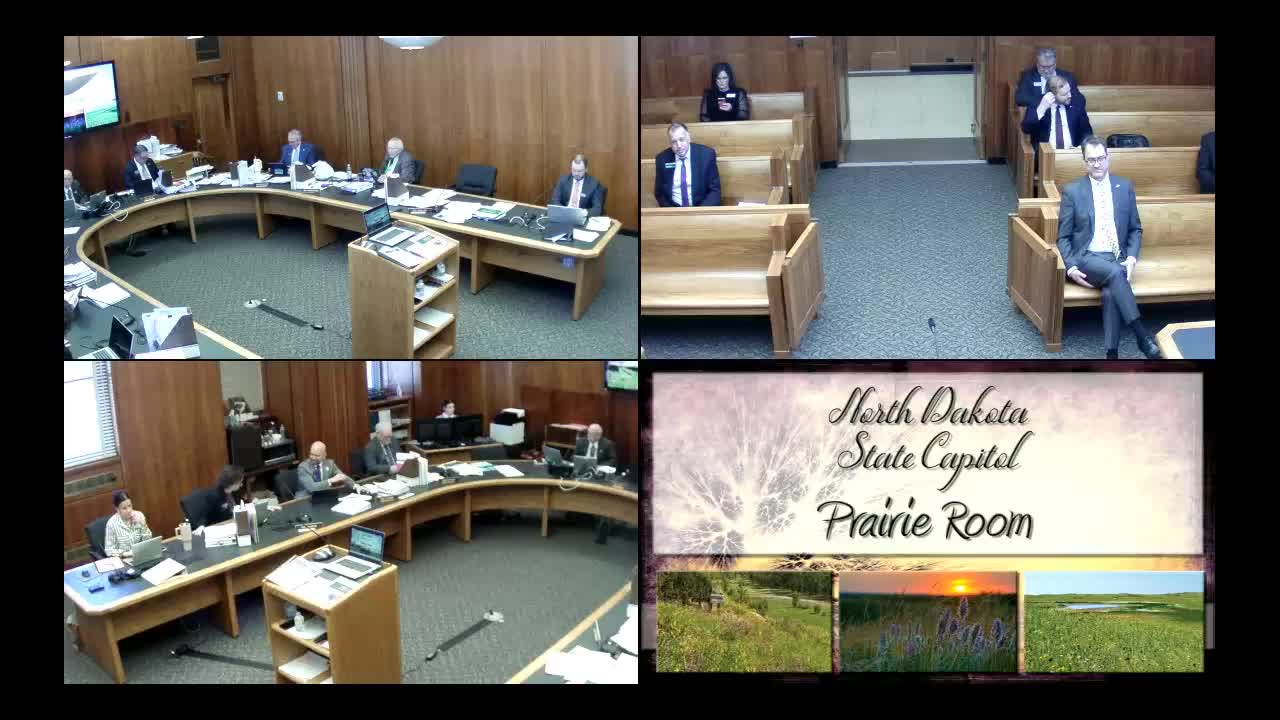NDSU urges higher pharmacy funding, outlines workforce-driven program priorities as cuts continue
Get AI-powered insights, summaries, and transcripts
Subscribe
Summary
NDSU President Cook told the state Appropriations - Education and Environment Division the university supports increasing the pharmacy funding factor and outlined a slate of workforce-oriented degree proposals while describing substantial faculty and staff reductions and steps to rein in tuition waivers.
President Cook, president of North Dakota State University, told the Appropriations - Education and Environment Division that the university supports increasing the pharmacy funding factor and has prioritized a list of workforce-oriented degree proposals if the Legislature provides new funds.
The university president told the committee that pharmacy education carries unique costs and a larger clinical scope in North Dakota, saying, "Pharmacists themselves in North Dakota, the scope of practice has changed dramatically." He said those changes increase quality, regulatory and data costs and that the pharmacy program includes laboratories, equipment and a significant research enterprise.
The funding discussion came as Cook and NDSU officials described deep personnel reductions under the university's NDSU Transform plan and changes made to tuition waiver policies. "We've cut 87.75 instructional FTE, but we've also increased non-instructional FTE by 26," President Cook said, explaining how the university arrived at a net instructional reduction figure after voluntary separations and program closures.
Why it matters: the Legislature's decision on the pharmacy factor and on any one-time or ongoing appropriations will affect recurring campus budgets, program startups and workforce training in fields such as robotics, precision agriculture and several health professions the university is proposing.
Pharmacy factor and how NDSU is framing it NDSU presented a handout and analysis at the committee's request showing its assessment of pharmacy program costs since the state funding formula was created in 2013. Cook said the university reviewed the factor at the Senate's request and recommended increasing it to better reflect costs and to bring pharmacy funding closer to medical programs. He noted that "90% of the pharmacists in the state, of course, are from NDSU." The committee asked whether a Senate appropriation (discussed as $12 million in the hearing) would be earmarked among engineering, agriculture and health; Cook said he would likely carve funding to cover academic priorities rather than distribute it in equal thirds.
Program priorities and workforce alignment Cook described "New Horizons," a menu of proposed new or expanded degrees driven by an industry advisory board he convened. He said the list prioritizes programs that industry advised have workforce demand in North Dakota, including a bachelor of science in robotics and automation, bachelor of science in agriculture technology (precision agriculture), additional allied health degrees and items relating to nursing and allied sciences. "We have these listed, I would say, in order of importance to us," Cook said, adding that some proposals already are moving through the State Board of Higher Education review process.
Cook and committee members repeatedly framed the proposals as workforce-driven: the university said it has worked with industry representatives and plans "earn and learn" models that link classroom instruction to employer internships or clinical placements so graduates are more likely to transition into jobs.
Personnel reductions, hiring strategy and tenure Committee members raised multiple counts for cuts and faculty losses; Representative Richter cited a reduction of "69 and a half FTEs," and Cook clarified the university's accounting: instructional FTE cuts, voluntary separations (about 18-19 faculty through voluntary separation agreements), program closures and other actions together produced the stated instructional reduction totals. Cook described a deliberate hiring strategy for workforce-oriented programs, favoring contract or "professor of practice" hires and lecturers initially to allow pivoting or exits if programs do not meet enrollment or financial targets.
Tuition waivers and graduate assistant support Karen Haigston, associate vice president for finance administration at NDSU, told the committee that institutional tuition waivers totaled $18,800,000 in FY 2024, down from $22,000,000 in FY 2023. She said a large portion of waivers is for graduate research assistants (doctoral-level research in agricultural research fields) and that the university is shifting costs where appropriate to grants and giving deans more responsibility under a new tuition allocation model.
Shared services across the system Bruce Bollinger, vice president for finance and administration, described an "organic" shared-services approach in which NDSU provides payroll and finance services to other campuses by agreement and charges only for the staff time involved. "We're doing payroll at Minot. We're doing payroll at Williston. We're doing business office functions at Dickinson," Bollinger said, listing several campuses receiving services. He said most agreements are annual and reimbursed by the client campus.
Questions, next steps and context Committee members pressed NDSU leaders about duplication of programs with nearby institutions (for example, some health professional degrees offered 70 miles away) and whether demand justified new programs. Cook and members emphasized market assessments and flexibility; Cook said he did not intend to duplicate programming inappropriately and framed the list as long-term workforce planning rather than immediate expansion in every area.
The committee did not take any recorded votes during the presentation. Members said they would continue to weigh any bill or amendment affecting the pharmacy factor and other NDSU funding requests in later appropriations discussions.
